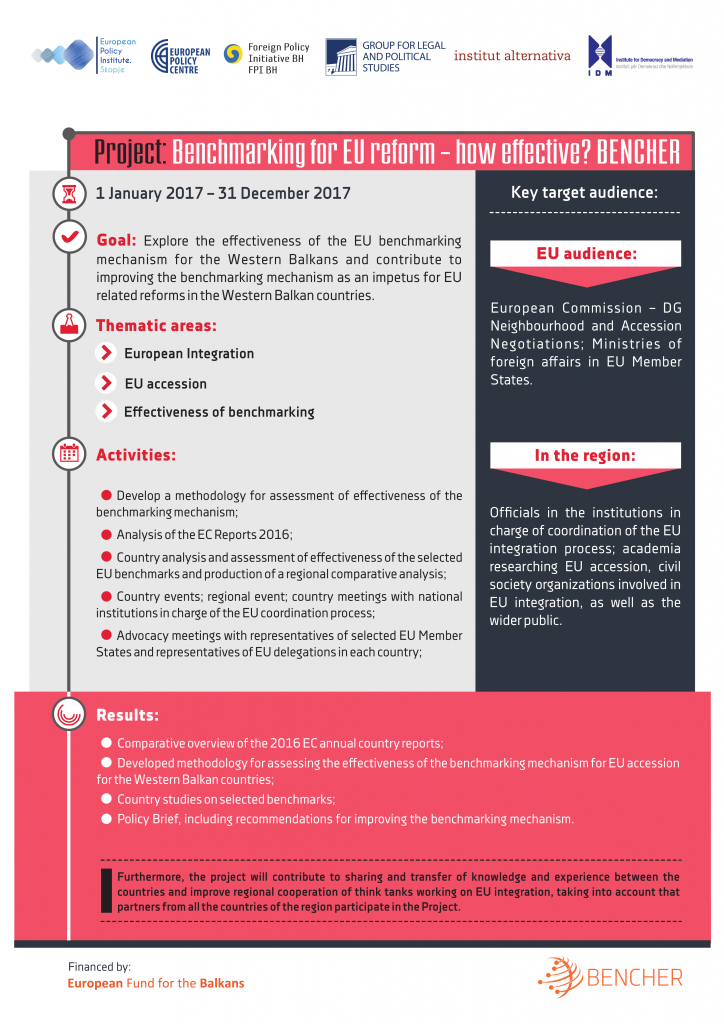Why? Policymaking in the Western Balkans (WB) is characterised by weak and unsystematic involvement of the civil society organisations (CSOs). On the other side, Visegrad Group (V4) countries have more advanced policymaking systems which ensure CSOs involvement, while CSOs themselves have greater capacities and experience in that respect. However, sustainable and effective CSO participation in the policymaking based on evidence is a longterm challenge and objective for both regions.
This project will address the deficiencies of policymaking systems by enhancing CSOs capacities from the WB to take more active part in the policymaking and advocate for a more enabling legal environment for the CSOs through learning from the experiences of the V4 countries.
How? Through the exchange of knowledge and experience within the V4 region and together with the WB partners through a consortium of 10 partners, capacities and advocacy potential of the organisations of both regions will be raised. The knowledge gained will be shared with 180 CSO representatives in the WB countries. The involvement of the civil servants in the project from relevant policymaking institutions in WB6 will increase their ownership and accountability.
Who? This project has been implemented by:
TEN network:
European Policy Centre, Serbia
Group for Legal and Political Studies, Kosovo
Foreign Policy Initiative BH (FPI BH), Bosnia and Herzegovina
Institute for Democracy and Mediation, Albania
European Policy Institute (EPI) Skopje, Macedonia
Institute Alternative, Montenegro
Partners from Visegrad countries:
EUROPEUM – Institute for European Policy, Czech Republic
Central European University, Hungary
Slovak Governance Institute, Slovakia
Fundacja IDEA Rozwoju, Poland
When? March 2017 – March 2018
Target audience: Our target audience are civil society organisations, civil servants, national governments and European Commission.
This project is realised with the kind support of the International Visegrad Fund
News
Civil Society and Policy Making in the Visegrad Group Countries: Lessons for the Western Balkans
It is our immense pleasure to share with you a collection of articles produced within the Visegrad project. This collection provides insights into challenges of civil society participation in policymaking in three countries of the Visegrad Group (Czech Republic, Hungary and Slovakia), in the intention to share valuable lessons for the Western Balkan countries. Find more about the publication here.
What’s the role and importance of think tank organisations today?
Final conference of the International Visegrad Fund Project “Raising capacities and advocacy potential towards more substantive involvement of civil society organisations of Visegrad group and Western Balkan countries” was held today in Belgrade. Read more about this event here.
Event announcement: Think tanks in policymaking – Challenges and impact in Southeast Europe
Final conference of the Project “Raising capacities and advocacy potential: Towards more substantive involvement of CSO of Visegrad group and WB countries” will be held on January 30, 2018 in Belgrade, at EU Info Centre Premisses. Read more about this event here.
Western Balkan Think Tankers and Civil Servants on a Study Tour to Slovakia and Czech Republic
On June 26-30, representatives of each of the TEN member organisations, together with civil servants from each of the Western Balkan countries, participated in a study tour to Bratislava (Slovak Republic) and Prague (Czech Republic). Read more about this study tour here.
Experiences of Polish and Hungarian CSOs in the Policymaking Process Shared in Budva, MNE
A two-day regional training “CSO Participation in the Policymaking: Experiences from Poland and Hungary” was held in Budva, Montenegro, on 12-13 May 2017. Read more about this training here.



